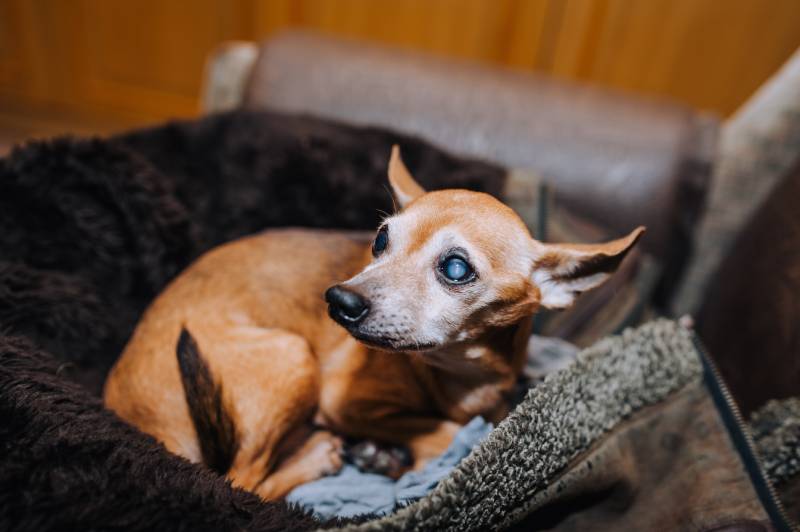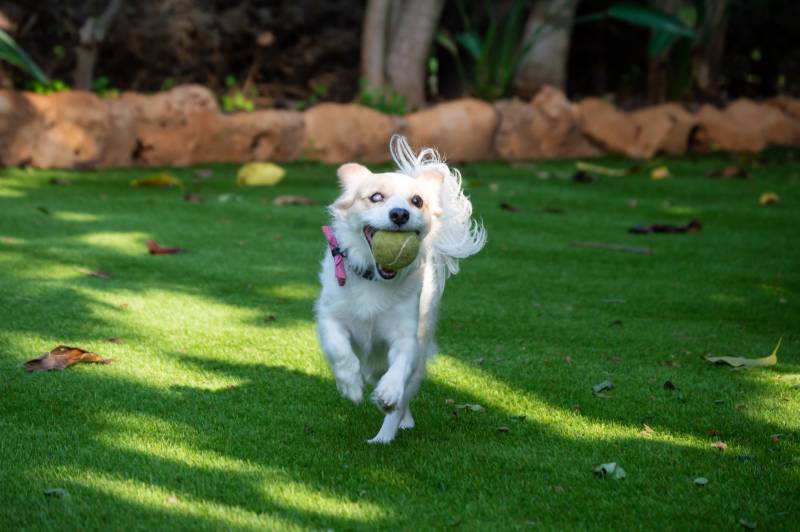Click to Skip Ahead
If your dog has been clumsier than usual or has suddenly become anxious about entering dark rooms, they might be displaying signs of an eye condition called progressive retinal atrophy. Progressive retinal atrophy, which affects a dog’s vision and results in eventual blindness, is a genetic condition that can’t be treated but, fortunately, can be managed.
If you suspect that your dog might be suffering from progressive retinal atrophy, read on to learn more about the signs to look for and how to care for a dog with this condition.
What Is Progressive Retinal Atrophy?
There are two types of photoreceptor cells in the retina, and they perform different functions. The rod cells help your dog to see in low light, whereas the cone cells allow your dog to detect colors. There are more rods than cones in a canine retina.
When the photoreceptor cells in the retina called rods and cones deteriorate (atrophy) in adult dogs, the condition is called progressive retinal atrophy. In most cases of progressive retinal atrophy, the rods deteriorate before the cones.
The two types of progressive retinal atrophy are early-onset and late-onset. Early onset PRA is far less common, and dogs start showing problems when they are around 1.5 years old. Late-onset PRA is a form of PRA that causes the rods and cones to deteriorate later in a dog’s life (3–9 years of age).
Progressive retinal atrophy progresses at different rates but is a typically slow-progressing condition. Unfortunately, it’s common for dogs to go blind 1–2 years after signs start to show. The good news is that though it can be upsetting to see your dog losing their sight, this disorder does not cause pain in dogs.
Progressive retinal atrophy doesn’t discriminate in terms of the breeds or age range it affects—any dog can develop this condition. However, some breeds are known to be more prone to it. Breeds with a higher risk of progressive retinal atrophy include:

Breeds With a Higher Risk of Progressive Retinal Atrophy:
- Portuguese Water Dog
- Spanish Water Dog
- Collies
- Irish Setters
- Miniature and Toy Poodles
- English Cocker Spaniels
- American Cocker Spaniels
- Labrador Retrievers
- Tibetan Terriers
- Tibetan Spaniels
- Long-Haired and Wire-Haired Dachshunds
- Yorkshire Terriers
- Bedlington Terriers
- Samoyed
What Are the Signs of Progressive Retinal Atrophy?
- Clumsiness, bumping into things
- Anxiety in the dark
- Dilated pupils
- Extra reflective eyes
- Cataracts (late stages)
As mentioned, progressive retinal atrophy is not painful, but it does manifest in a variety of ways. The signs sometimes don’t become obvious until the condition has progressed to a late stage.
Signs to watch out for include clumsiness, bumping into things (especially in low light or unfamiliar environments), being anxious about going into dark environments like rooms or outdoors at night, dilated pupils, the eyes becoming more reflective when light is shone on them (look for the eyes glowing more than usual in flash photos, too), and cataracts in the late stages.

What Are the Causes of Progressive Retinal Atrophy?
Progressive retinal atrophy is genetic, so dogs inherit it from their parents. It’s usually caused by something called an autosomal recessive trait, and dogs with this trait receive defective gene copies from both parents, not just one. In some breeds, however, it’s more likely for dogs to inherit a defective gene copy from just one parent. In these dogs, the progressive retinal atrophy gene is dominant.
It’s possible to have dogs screened for progressive retinal atrophy to determine whether these traits are present, but there’s no guarantee that a dog won’t experience the condition even if the test is clear because, though many of the genetic disorders that cause PRA are known, some are not.
How Do I Care for a Dog with Progressive Retinal Atrophy?
Learning that your dog will go blind is incredibly distressing, but there’s no reason why dogs with progressive retinal atrophy can’t live a comfortable and fulfilling life. One thing to bear in mind is that dogs have a great sense of smell and hearing, and these senses can help them navigate the world even after they’ve lost their vision. Here are some tips for making life easier for your dog with PRA:
- Dog-proof your home to make sure your dog doesn’t fall down the stairs or bump into something dangerous. Baby gates are good for this purpose.
- Creating a familiar routine will help your dog feel safer.
- Avoid moving things like furniture and food and water bowls around too much. Your dog will feel much more secure if everything is kept in the same place.
- Use sound to help your dog find things, for example, by using a water fountain instead of a water bowl. This will make a noise and therefore make it easier for them to find.
- Teach your dog some verbal cues before they go completely blind to help them navigate their environment, like “up”, “down”, “left”, and “right”.
- If your dog still has some of their vision, give them more light around the house.
- Speak to your vet about whether or not they think antioxidant supplements might benefit your dog. These won’t treat the condition, but they might slow down the development of cataracts.
- Communicate with others so they know about your dog’s condition, so they know how best to approach your dog without startling them.
Frequently Asked Questions
How Fast Does Progressive Retinal Atrophy Progress in Dogs?
This condition usually progresses gradually, but most dogs lose their vision entirely within 1–2 years of the first signs becoming apparent. It also depends on how early the signs are detected.
Can Progressive Retinal Atrophy Be Treated?
Unfortunately, the condition cannot be treated but it can certainly be managed. Dogs with the condition can still have a good quality of life even when completely blind. You can take certain measures to make your dog more comfortable and secure, like, for example, identifying danger zones in your home (like stairs) and putting up baby gates or other barriers. Giving your dog a routine and familiar surroundings to rely on is also very helpful.

Can I Prevent My Dog from Getting PRA?
No, there is no way to prevent progressive retinal atrophy, however genetic testing for some form is available. Breeders can take steps to reduce the risk of other dogs inheriting the condition by not breeding dogs affected by PRA or carrying the abnormal gene.
Conclusion
Though a progressive retinal atrophy diagnosis can sound scary, especially since there is no treatment or method of preventing it, you can take comfort in the fact that the condition is not painful and can be managed with some simple environmental adjustments.
Blind dogs are good at acclimating to a life without vision thanks to their impressive senses of hearing and smell. Nevertheless, predisposed breeds should be tested and PRA carriers or affected dogs should not be bred to prevent the condition from being passed down to future generations.
Featured Image Credit: Lutsiv Maxim, Shutterstock














